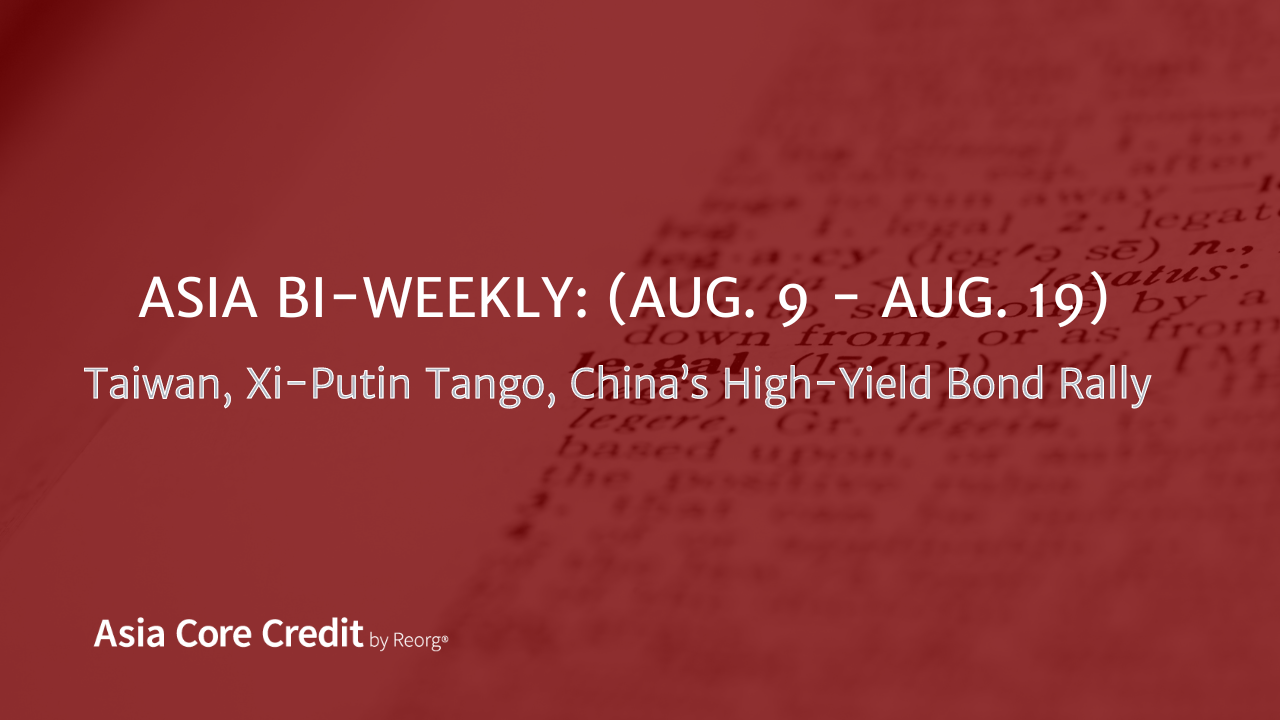Asia Bi-Weekly: Taiwan, Xi-Putin Tango, China’s High-Yield Bond Rally (Aug. 9 – Aug. 19)
From Reorg Asia’s Managing Editors
In this column, managing editors Stephen Aldred and Shasha Dai take turns writing about trends in high yield, distressed debt, restructuring and bankruptcy in major Asian markets including China, Southeast Asia, India and Australia. Any opinions or other views expressed in this column are the author’s own and do not necessarily reflect the opinion or views of Reorg or its owners.
One of the news headlines from the past couple of weeks was that China Bond Insurance Co. Ltd. is providing full guarantee for debt issuances by six real estate developers. Chinese property bonds rose broadly subsequent to the news, with a few beneficiaries of the policy including Country Garden, CIFI and Longfor leading the rally.
Country Garden bonds’ rally would have seemed somewhat counterintuitive as it coincided with Fitch Ratings’ downgrading the developer’s credit ratings to BB+ from BBB-. Losing the last of its investment grades didn’t prevent its bonds from rising on the back of policy support, as some buyside sources said the bonds were already treated as high yield. The next day, Country Garden’s due 2024 notes edged down as investors looked to sell on good news.
In an email statement in response to Reorg inquiries about whether Fitch would have taken into account promised guarantees from China Bond Insurance Co. and how that consideration might have affected its ratings decisions, a spokesperson wrote that Fitch was “unable to comment on unconfirmed reports.”
“But generally speaking, Country Garden’s access to domestic funding was one of the main factors considered for its rating,” the spokesperson wrote in the statement. “As mentioned in the press release, ‘Country Garden’s progress in securing additional onshore capital-market financing, potentially with credit enhancement measures, is key to demonstrating viable capital market access.’”
In addition to capital market access, Fitch also monitors the company’s cash flow pressure from the decline in contracted sales and ongoing construction outflows, the spokesperson concluded.
As we reported, guarantees from China Bond Insurance Co. is the latest iteration of credit enhancement measures aimed at bolstering new debt offerings, with the last round coming in the form of credit default swaps and credit risk mitigation warrants from underwriters.
It’s hard to tell whether the latest policy incentive portends a position of strength (support of the central bank caliber is on the table) or a position of weakness (the government is running out of options). China will do everything in its power to ensure a soft landing of its real estate sector, but the interests of offshore investors are the last on its priority list. A case in point: Evergrande’s restructuring plan, previously anticipated to be announced by the end of July, is now expected to be released “within 2022.”
A larger question is: To what extent will China continue to play by the global capital market’s rules in its seeking of balance between domestic and international priorities? Recent events have made my Feb. 7 essay seem prescient, in which I wrote: “Images of Putin and Xi standing shoulder to shoulder are akin to giving the U.S. the middle finger (or two). Just hours earlier, the U.S. reported that Russia might be circulating allegedly fabricated videos of Ukraine attacks on Russian interests as a pretext for invading Ukraine. Both China and Russia have long imperial histories, feel that they have been wronged by capitalist powers and harbor geopolitical aspirations. Both have territories that they deem integral to their states—for Russia, it’s Ukraine; for China, Taiwan. Keeping Putin and Xi joined at the hip is their shared desire to stand up against Western military prowess and the conviction that they should divide spheres of influence in Eurasia and keep out U.S. sway.” Sounds familiar?
Nancy Pelosi’s visit to Taiwan pushed China more firmly into the arms of Russia—and the U.S., the other direction. What followed was a cascade of events that seemed to be out of a historical movie: more U.S. congressmen visiting Taiwan, China joining military exercises in Russia’s Far East, the U.S. and Taiwan kicking off trade talks.
Commentary about China’s military exercises around the Taiwan straits post-Pelosi visit showcasing the Chinese capability of blockading the island was viable but missed a bigger point. Zoom out on the map, and one will see that China is being isolated. Along its coastlines are U.S. allies, friends and trade partners: South Korea, Japan, Taiwan and most ASEAN countries. Its landlocked frontier provinces of Xinjiang and Tibet are hotbeds of separatist forces. Mongolia, which borders China’s Inner Mongolia, isn’t particularly friendly, either. The only sympathetic actor that matters is Russia.
Putin knows that. Xi knows that Putin knows that. Putin knows that Xi knows that he knows that.
This isn’t a tongue twister. It’s the tempo of the Xi-Putin tango, the pact for the China-Russia honeymoon.
For those who manage money invested in Chinese credit, reading history books is perhaps as important as reviewing bond indentures.
–Shasha Dai, Managing Editor – China
